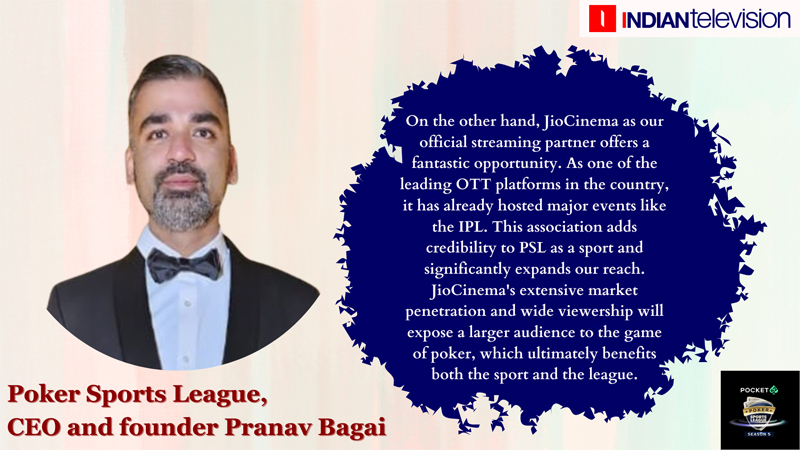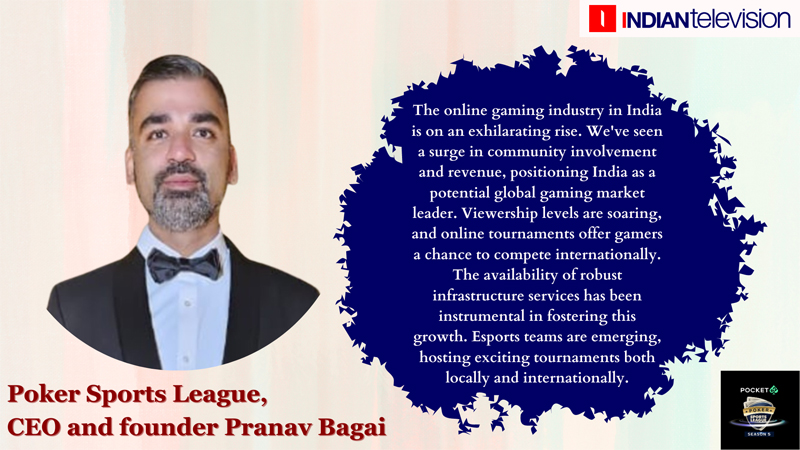Mumbai: Esports has emerged as a popular form of entertainment among the current generation, with professional gamers and teams competing in organised tournaments and events. The industry has seen significant growth in recent years, with the rise of online streaming platforms and increased investment from sponsors and advertisers. Similarly, online poker games have become a convenient and accessible way for players to enjoy the classic card game from the comfort of their own homes. However, advancements in technology have also brought about new challenges, such as concerns around cheating and security in online poker games.
The architect of Poker Sports League CEO and founder Pranav
Bagai is one of the early proponents of poker in India. Bagai’s foray into the poker industry began with “The Shark” in 2008 and since then has created multiple poker related IP’s, published India’s first poker magazine (Card Player India) and
provided consultancy to India’s top online poker operators.
To further discuss the online poker gaming industry, its pros & cons and more such things, Indiantelevision.com caught up with Poker Sports League CEO and founder Pranav Bagai.
Edited Excerpts:
On online poker market tripling in size in recent years, the key driver behind the growth and the evolution of this trend in the future
The remarkable growth of the online poker market can be attributed to several key drivers. Firstly, the widespread penetration of mobile devices has played a significant role, enabling easy access to online poker platforms, and attracting a larger user base. Secondly, extensive marketing efforts, including celebrity endorsements and substantial advertising investments across various platforms, have greatly contributed to the market's expansion. Moreover, there has been a notable shift in the perception of poker, with people increasingly recognising it as a game of skill rather than mere chance. Additionally, generational change has played a crucial role, as younger individuals who have grown up observing their parents' involvement in online poker are now actively participating in the game. Looking ahead, with increasing clarity in regulations and the entry of more companies into the market, the trend of online poker is poised for further evolution and growth. The industry is likely to witness a significant transformation as more poker and gaming companies explore opportunities in this space, driven by greater regulatory clarity provided by the Ministry and central bodies.
On technology transforming the game of poker in India, playing a role in the success of the Poker Sports League, and the contribution to the evolution of poker's perception as a skillful and legitimate competitive sport in the country
Technology has revolutionised the game of poker in India, paving the way for its recognition as a legitimate and competitive activity. The Poker Sports League (PSL) has been a driving force in reshaping public perception and establishing poker as a skillful sport. Through the involvement of esteemed brand ambassador Mr. Vishwanathan Anand in our earlier seasons, the league has set a remarkable benchmark in promoting poker as a game that requires strategic thinking and expertise. Notably, the absence of wagering, gambling, and betting in PSL has solidified its reputation as a skill-based endeavor. This, coupled with the league's legal status and its widespread broadcasting on platforms like VOOT and JioCinema, has effectively showcased the skill aspect of poker to a broader audience. Furthermore, the increasing number of professional players and the growing acceptance of poker as a viable career choice by parents have contributed to its success and evolution. In essence, technology, alongside the Poker Sports League, has played a transformative role in reshaping the perception and future of poker in India.
On inspiration of the idea and concept behind the Poker Sports League, and its evolvement over the first four seasons
The idea and concept behind the Poker Sports League (PSL) originated from a meeting with Mr. Berman, the former chairman of Dabur. He approached us with the vision of establishing a poker league due to his previous experience with owning teams in other sports leagues and recognising the growing popularity of poker. The main concept behind PSL was to transform poker, traditionally an individual sport, into a team-based competition. We wanted to provide a platform where players could collaborate and compete together, unlike the usual scenario where even friends end up competing against each other.
Over the course of the first four seasons, the PSL has undergone significant evolution. It has been a period of continuous learning, as we aimed to develop a successful business model and improve various aspects such as the game format, broadcast, partnerships, and sponsorships. There was a fair amount of trial and error involved, but these experiences allowed us to refine our approach.
We are proud to state that we have now cracked the business model.

One significant aspect of the league's evolution is the increasing participation in the qualifiers. In the first season, we had approximately 1,500 people competing for 36 spots. While the maximum number of participants in the subsequent seasons was around 2,000, this season we have witnessed an astonishing figure of almost 10,000 participants. This remarkable growth can be attributed to the rising popularity of poker, its accessibility, and its acceptance among players.
Moreover, we have focused on enhancing the user experience for players. In the current season, we have partnered with Pocket52, who recently launched a new app with excellent user experience (UX) and user interface (UI). This development has significantly improved the playing experience for our participants.
On sharing some insights into the marketing and financial aspects of the Poker Sports League, and your plans to continue growing the league in the future
In terms of finances, owning a team in the Poker Sports League costs around one crore. Out of the six teams, the top three are expected to break even or make a profit based on their performance. The bottom three teams may experience losses if they don't secure a top-three position, but their investment isn't too high, making it more sustainable. Each team receives a 40 per cent revenue share, further enhancing their financial prospects.
For marketing, we've used various channels like influencers, Jio, and meme marketing. We've also tapped into Pocket52's multimillion user database. Our marketing efforts will reach over 200 million people during the four-month PSL season.
Moving forward, our aim is for each team to break even in Season Seven, making team ownership more financially viable. We'll continue to focus on expanding our marketing reach through different channels to attract more participants, fans, and sponsors.
On the partnership with JioCinema as the official streaming partner and Pocket52 as the title sponsor for season five, and your view partnership
The partnerships with JioCinema and Pocket52 play a significant role in the growth and success of the Poker Sports League (PSL). Pocket52, our title sponsor for season five, is not only a financial partner but also brings valuable technological expertise. Their app enhances the user experience, particularly during qualifiers, and provides us with valuable data for tracking and evaluating marketing activities.

On how the government regulations have played a role in supporting the growth of the Indian poker industry, and your anticipation for the future of these regulations
Recognising poker as a game of skill has been a game-changer, providing a solid and secure environment for players, shielding them from fraudulent activities. Thanks to this support, we've witnessed the rise of trustworthy platforms that have cemented the industry's position. Looking ahead, it's exciting to anticipate continued government support, given the surging popularity of poker. The future of the Indian poker industry looks incredibly promising, with the government's unwavering backing and a bustling market filled with reputable platforms. We can expect great things on the horizon.
On the present landscape of the online gaming industry in India, and what opportunities and challenges for the industry in the years to come

In the foreseeable future the industry is poised for tremendous expansion with the rapid adoption of mobile technology and a growing user base. Despite challenges like taxation issues and consumer confidence in payment methods, the future looks incredibly bright for the online gaming industry in India. It holds immense potential for creativity, investment, and becoming a global gaming powerhouse.
On 6 April the Indian government issued regulations to govern the online gaming industry, prohibiting games that involve wagering or betting with real money, what are your thoughts on this, and will it affect online gaming
The recent regulations issued by the Indian government for the online gaming industry mark a significant milestone in the sector's comprehensive regulation. This step is crucial for the industry to compete on a global scale, foster innovation, and contribute to the vision of ‘Create in India’ and ‘Brand India’, as envisioned by our Hon'ble Prime Minister. Overall, these regulations have the potential to generate employment opportunities within the country.






